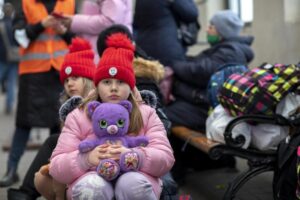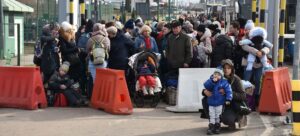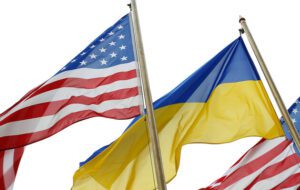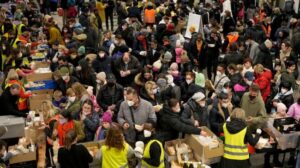
The relevant bill will be considered in the Bundestag.
If adopted, from June 1, 2022, citizens of Ukraine who have received a residence permit in accordance with the law on the stay of foreigners will receive social assistance in the amount of 449 euros. Now the amount of payments is about 300 euros. More than 400,000 Ukrainian refugees have already arrived in Germany, and about 3,000 more are arriving every day, according to the Ukraine Round Table held in Berlin on Monday with the participation of German Chancellor Olaf Scholz.
According to the information, more than 60 thousand Ukrainian schoolchildren are already studying in Germany, and graduates of Ukrainian schools were allowed to enter German universities without a diploma. According to the UN data, as of 13:00 on April 24, a total of 5.23 million people left Ukraine since the beginning of the war (excluding the entry flow), of which 2.91 million went to Poland, 843.74 thousand to Romania and Moldova. , Russia – 605.82 thousand, Hungary – 492.98 thousand, Slovakia – 355.59 thousand, Belarus – 24.48 thousand.
At the same time, according to the State Border Service, 1.17 million people have entered Ukraine by this date since February 28.

The number of internally displaced persons (IDPs) in Ukraine due to the war unleashed by Russia has reached 7.7 million compared to 854 thousand before the start of the war, as of April 21 this estimate was given by the Office of the United Nations High Commissioner for Refugees (UNHCR ), which as of April 6 estimated this figure at 7.1 million.
“The Russian Federation launched a military offensive against Ukraine on February 24, 2022. To date, more than 5 million refugees have left Ukraine, making this the fastest growing refugee crisis since World War II. Another 7.7 million people have been displaced inside Ukraine,” it says in a report on his website.
UNHCR estimates that some 13 million people are stuck in affected areas or unable to leave due to heightened security risks, destruction of bridges and roads, and a lack of resources or information on where to find safety and shelter.
The organization notes that the delivery of vital aid remains challenging due to the lack of safe humanitarian access.
Citing UNICEF and WASH partners, UNHCR reports that 1.4 million people are currently without access to water in eastern Ukraine and that another 4.6 million people across Ukraine are at risk of losing such access. The organization also points to the persistence of the difficult situation in Kherson.
“UNHCR continues to call for the protection of civilians and civilian infrastructure, respect for international humanitarian law, and neighboring countries to continue to keep their borders open to refugees,” the report emphasizes.
As Prime Minister Denys Shmygal said on April 13, 1 million people have already registered as new IDPs as a result of the Russian invasion. The state announced that it would make monthly payments for registered IDPs in the amount of UAH 2,000 per adult and UAH 3,000 per child.
According to UNHCR data, as of 13:00 on April 22, a total of 5.16 million people left Ukraine since the beginning of the war (excluding the flow to enter), of which 2.88 million went to Poland, 838.86 thousand to Romania and Moldova. , Russia – 578.26 thousand, Hungary – 485.62 thousand, Slovakia – 352.29 thousand, Belarus – 23.9 thousand.
The UNHCR, referring to data from the State Border Service of April 22, also indicated that since February 28, the flow to enter Ukraine amounted to 1.12 million people, thus the total number of refugees is about 4 million.

The United States is launching a new program for the admission of refugees from Ukraine, which is designed to supplement the ways of entry for them into the country, US President Joe Biden said on Thursday.
“We have already accepted tens of thousands of Ukrainians, and today I am announcing the Unite for Ukraine program, a new program that will allow Ukrainians seeking refugee status to travel directly from Europe to the United States,” he said.
“This new program will complement the existing routes of entry available to Ukrainians,” Biden said.
Earlier, the United States announced its readiness to accept 100,000 Ukrainian refugees.

Russia’s war against Ukraine, which began on February 24, has forced 5 million 34,44,000 people as of mid-day April 19 to leave the country in search of safety, protection and assistance, the UN High Commissioner for Refugees (UNHCR) has released this data.
It also for the first time made public data on the flow into Ukraine, citing the State Border Guard Service, according to which from February 28 to April 18, it was 948,500 people, while spokesman Andriy Demchenko on Wednesday estimated it since February 24 at 1.1 million.
Department specifies that the Ukrainian-Polish border accounted for 56.1% of all exits: 2 million 825,460. According to the Polish Border Agency’s data made public on Wednesday morning, 2.9 million people have entered the country from Ukraine since the war began, and 756,000 have passed in the opposite direction.
Romania and Moldova received 821,052, some 471,008 arrived in Hungary, and 342,081 in Slovakia.
The number of people, crossing the border between Russia and Belarus, has been growing at an accelerated rate compared to the EU and the Republic of Moldova over the past month: April 19, it reached 549,081 and 23,076, respectively.
For comparison: if since March 15, the number of those who entered Poland, Hungary, and Slovakia increased by 58-78%, then to Russia – 3.8 times, to Belarus – 19 times. According to Ukrainian authorities, a significant part of Ukrainian citizens were displaced to the territory of Russia and Belarus from the war zone or from the occupied territories against their will due to the absence of humanitarian corridors to Ukraine.
In general, the flow of people leaving the country has slowed down considerably compared to the beginning of the war and is gradually stabilizing: if in the first 19 days of the war 3 million people left Ukraine, it took first six days to increase by another half a million, then nine, and for the next two increases of half a million, eleven days each.
During the European Easter holidays, for the first time since the beginning of the war, the State Border Guard Service recorded a greater flow of people entering Ukraine at its western border on some days than exiting. In total, over the past seven days, about 250,000 people left the country and 225,000 entered.
UNHCR indicates that as of mid-2021, there were 53,047 Ukrainian refugees around the world seeking the appropriate status, including 36,049 in Europe.
The Ukrainian diaspora in the world by mid-2020 was estimated by UNHCR at 6.1 million, including 5 million in Europe.
The organization specifies that the right to free movement within the Schengen area means that there are very few border controls in the European Union, so data on arrivals in Hungary, Poland, and Slovakia reflect only border crossings in these countries, but the UN estimates that large numbers of people have moved to other countries.
In addition, UNHCR does not count people from border countries leaving Ukraine and returning home.

Federal Minister of Digital Technologies and Transport of Germany Volker Wissing says that the flow of refugees from Ukraine has significantly decreased and stressed that the German state does not intend to impose any restrictions on the admission of Ukrainian refugees.
“The number of refugees traveling to Germany by train has dropped significantly from its peak at the beginning of the war, from around 8,200 to the current around 2,500 people a day. However, we maintain logistical and transport structures because we cannot predict the course of the war at any moment may face an increase in the number of refugees. We must expect further escalation and be prepared. Those in need in Ukraine should be able to find asylum in Germany,” Wissing said in an interview with the German Editorial Network (RedaktionsNetzwerk Deutschland, RND).
When asked if there is an upper limit for accepting refugees from Ukraine, the minister replied: “This question does not arise. Germany cannot and will not reject refugees from Ukraine.”
He also noted that Germany is working on accepting Ukrainian refugees who were previously settled in the EU countries neighboring Ukraine, and is also working to ensure that other EU countries are involved in this, recalling that a number of Polish cities have reached the limit of their capacity to accommodate Ukrainians.
“We quickly became convinced that people traveling from Ukraine could be transported from Poland to Germany. There are distribution centers in Hannover, Cottbus and Berlin…. If there is a threat of congestion in neighboring Ukrainian countries, we must again campaign for their distribution throughout the EU .I am in constant contact with my European colleagues,” Wissing said.
Asked about his attitude to the energy embargo against Russia, the minister noted that Germany “very quickly launched a comprehensive package of sanctions together with its European partner countries and the United States, but the impact on our society must also be taken into account when deciding on sanctions.” “Nothing would be more beneficial to Mr. Putin than if we took action that would lead to a quarrel and ultimately divide our society,” he stressed.
“Germany is very aware of its role and acts responsibly. We avoid acting alone and act in close coordination with our European partners,” Wissing concluded.